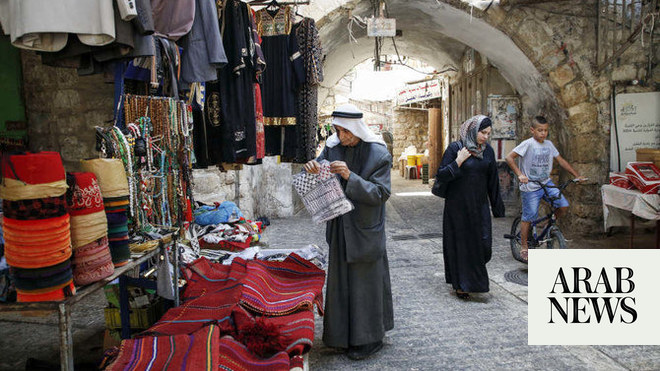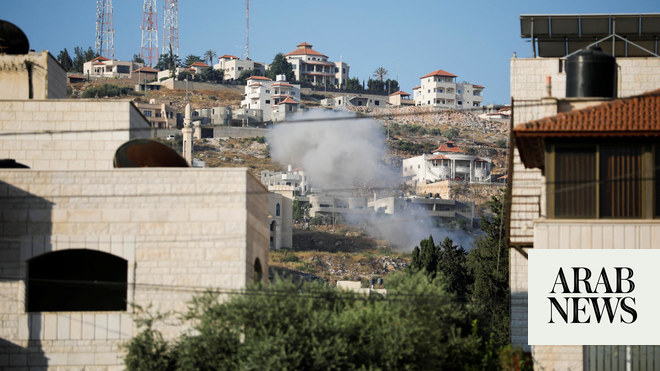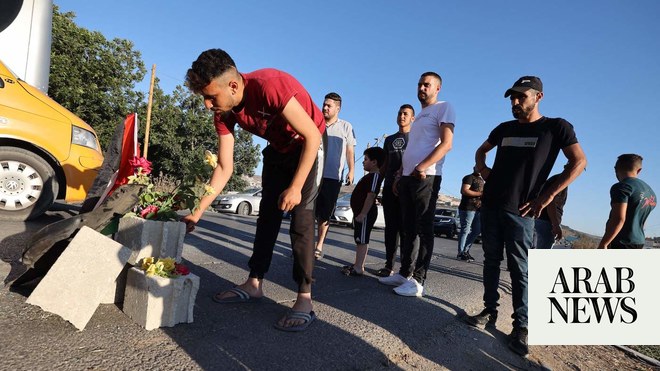
In the last few days of Ramadan, markets are bustling with shoppers stocking up on Eid supplies
Business owners report brisk trade despite higher prices for most goods during Ramadan this year
RAMALLAH: Preparations are well underway among Palestinians in the West Bank and East Jerusalem for Eid Al-Fitr, which is expected to fall on April 21.
Markets are bustling with shoppers and many stores remain open past midnight. Confectioners, butchers, barbers, clothing and shoe stores, toy shops, jewelers, gift shops and cafes all report brisk business late into the night.
Traffic police have closed city center streets to vehicular traffic to allow more freedom of movement for shoppers and help traders who display their goods in makeshift roadside stalls.
On Tuesday, the Palestinian government gave public-sector employees an advance payment of 30 percent of their April salaries so that they can buy the Eid supplies they need. In addition, this month the government will pay them their full salary for the first time in a year, after cutting wages because of a severe financial crisis.
Meanwhile, shoppers have been faced with a sharp increase in the prices of all goods during Ramadan, a trend that is expected to continue until the end of the Eid holiday. Families on low incomes facing particular hardship have received assistance from charities during the holy month.
In the last few days of Ramadan, communal iftars continue in homes and restaurants, and the number of people making an effort to get together with family and friends has increased.
Duha Asous, from the village of Burin, near Nablus, spent Laylat Al-Qadr (the Night of Power) at Al-Aqsa Mosque. The holiest night of the year for Muslims, marking the night the Qur’an was sent from Heaven to the world, it is celebrated on one of the odd-numbered nights during the last 10 days of Ramadan.
Asous then returned home to start making special Eid cakes, a tradition she inherited from her mother. On each of the last three days of the holy month she makes 4 kilograms of the date-and-walnut cakes and hands them out to neighbors, relatives and the poor.
Amer Izz Al-Din Hamdan, from the old city of Nablus, told Arab News the traffic congestion since Eid shopping began in earnest has been unprecedented this year.
“Nablus is famous for making high-quality and distinctive oriental sweets, in addition to the famous nut roasters,” he said.
“The prices are lower than those in neighboring cities while the quality is higher, so shoppers from the surrounding villages and cities rush to shop in Nablus.”
Many Palestinians living in Israel also come to shop in West Bank cities in the run-up Eid, providing the local economies with a boost.
Hamdan said he likes to go shopping with his children a week before Eid, to try to avoid the crowds. In keeping with local traditions, he buys salty fish to eat on the morning of Eid. Special seasonal cakes, chocolate, coffee and nuts are other essential hospitality items, he added, and his family also burns incense in the house on Eid morning.
“An atmosphere of joy prevails in the markets of Nablus, which are crowded with shoppers,” Hamdan said. “Most of the families leave their homes after dinner for Eid shopping.”
Ashraf Abu Eid, the owner of Al-Amin Butchery in Ramallah, told Arab News that a sharp increase in meat prices a week before the start of Ramadan had affected demand throughout the holy month.
“A kilo of veal is sold for $15 and a kilo of lamb is sold for $23,” he said. “We prepared ourselves for a prosperous sales season and brought all kinds of meat but the season was not as good as that in previous years. Sales decreased by 50 percent compared with the previous Ramadan.”
Imad Muna, a prominent figure in the Jerusalemite community, told Arab News that markets in Jerusalem’s Old City and eastern area has experienced a tremendous economic boom during Ramadan thanks to the tens of thousands of people from the West Bank who had come to pray at Al-Aqsa Mosque. Thousands of Palestinians who live in Israel also came to pray at the mosque and shop at Palestinian markets in the city, he added.
“Ramadan was a good season for reviving the city’s markets, economically,” said Muna.











